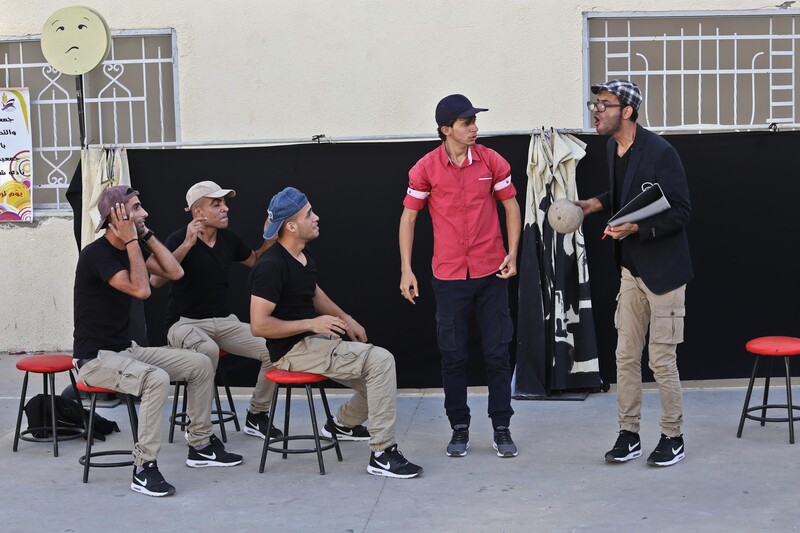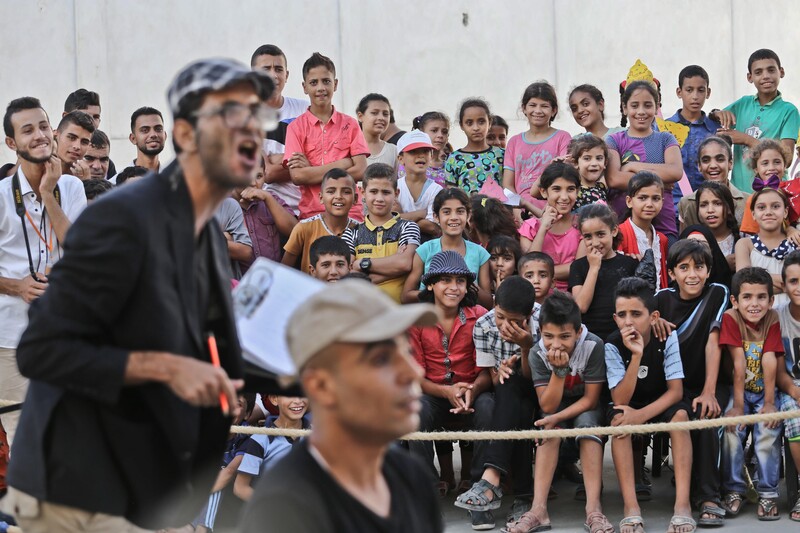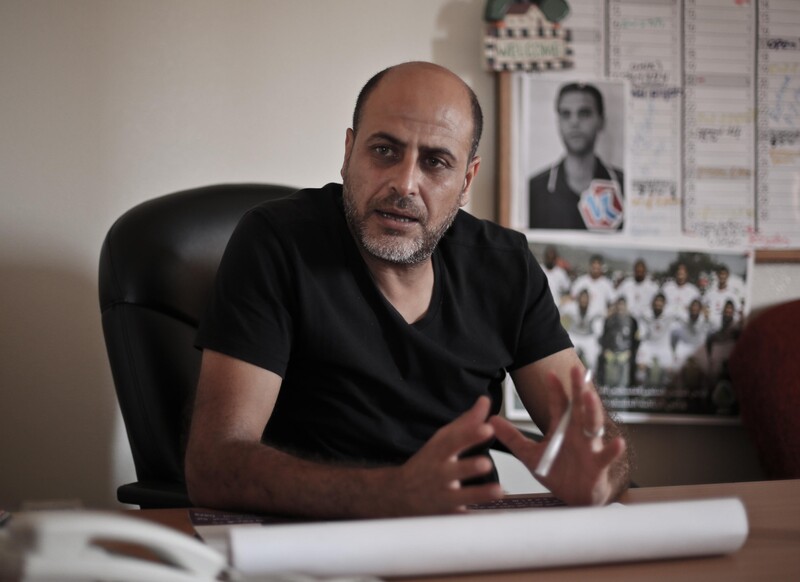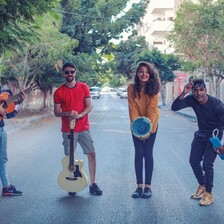The Electronic Intifada Beit Hanoun 27 October 2016

Salem, in red, faces discrimination from his teacher and fellow students in a classroom scene from In the Rectangle of Doubt.
The scene is unexpectedly fraught.
In a classroom in Gaza, new students have been asked to say where they live. It is ordinarily a simple enough question, but one student stumbles. It soon becomes clear that he is Bedouin. The attitudes of teacher and peers change almost immediately.
The scene comes from a new play that is unusual in more ways than one: It publicly confronts audiences in Gaza with social ills that are rarely so openly portrayed and, for the first time, according to the organizers behind the performance, does so in the format of street theater.
For the past several months, Palestinians in Gaza have been able to catch In the Rectangle of Doubt on public streets or in local institutions, a departure from the more familiar street-performing clowns or puppeteers. And unlike such performances, what Theatre Day Productions is trying to accomplish is altogether more ambitious.
“We wanted to raise people’s awareness of social problems with real street theater,” Tania Murtaja, the external relations officer of the non-profit theater company, told The Electronic Intifada.
The format, she explained, is very effective in connecting with audiences, necessary when confronting people with problems in their midst. And discrimination against Bedouins was chosen as the topic of the play after months of brainstorming and research.
“We noticed the discrimination against the people of Um al-Nasser,” said Murtaja, referring to a Bedouin village in the far north of the Gaza Strip where residents maintain distinct traditions and customs. “So we went there, brimming with questions about their lives and experiences.”
The show
The show is mobile and has traveled around the Gaza Strip. First, a technical team of four arrives to set up the stage. Then music — traditional recordings of Bedouin songs, with their distinctive rhythms and melodies — is played to gather an audience.
The play itself revolves around the story of Salem, a young man who has suffered discrimination and is invited to talk about it on a TV program, the eponymous (to the play) In the Rectangle of Doubt. This conceit allows the character both to verbally relate and perform different situations he has experienced.
Among these situations is the classroom scene confronting new students. All the students answer without hesitation, when the teacher asks where they live, but Salem stays silent. Then:
“From where I live, if I look west, I see the sea. If I look north, I see the Israeli border fences. But if I look south, I see a huge wastewater pond. And if I look east, I see nothing but streets.”
The teacher understands immediately. “You live in Um al-Nasser,” he asserts, and from then, no matter how diligently Salem works, the boy is dealt with differently.
Thus the play traces the life of Salem and the obstacles he meets, obstacles that actors discuss from the stage with the audience after the play is over.
Months of preparations
The actors — six in all — have meticulously prepared, both from teaching in the village and by creating their own show.
Eighteen drama sessions were organized in Um al-Nasser’s two schools.
“We focused on teaching the children how to express themselves through theater. At the end, we had simple performances played by children themselves,” said Murtaja.
Children were allowed full freedom to choose their own ideas for their short performances, Murtaja said, while female actors with the theater company spent time with the women of the village.
“Our role was to put their ideas into an artistic frame.”
For four weeks, the actors lived in Um al-Nasser. They ate, talked and played together.
“I was very curious,” said actor Said Khawalda, 27. “And I’ve been enthused by them. They have their own history, dreams and traditions.”

Children watch In the Rectangle of Doubt being performed in Beit Hanoun.
After the drama sessions, a group of children from the village was invited to perform, with the actors, on stage.
“It was an amazing experience. It was their first time to stand on a stage. And we got many ideas for our play from them,” Khawalda said.
Theatre Day Productions then took another eight weeks to write and rehearse its own play before it debuted in Um al-Nasser itself in August. The comments of the residents of Um al-Nasser proved invaluable.
“We worked hard, with the people of Um al-Nasser, to show their real situation,” said Khawalda.
No street unturned
“When I joined, 20 years ago, we dreamed of one day performing in every school in Gaza,” said Rafat al-Aydeh, the artistic director of Theatre Day Productions and director of In the Rectangle of Doubt. “Now we have branches in the West Bank, we have street theater and very talented actors with the flexibility and skill to perform in streets.”
In early October, the company performed in Beit Hanoun, a town on the northeastern fringe of the Gaza Strip. The audience there was fully engaged, laughing, clapping and cheering along with the performance.
Children flocked to the play.
“We were playing in the area when we heard the sound of the play,” said Omar al-Masri, 12, who ran to see what was going on with his cousin, Yazan, 11. “It’s our first time watching a play and we liked it, especially the music and the funny actors.”

Rafat al-Aydeh, artistic director of Theatre Day Productions, aims to hold performances in “every street in Gaza.”
But older generations came too.
Walid Abu Ouda, 60, said this was the first time he had seen anything like it. “I’ve been coming to this club for years. It’s my first time to see such meaningful activity. We got the message and I’m sure it will influence us.”
The concept of street theater is alien to many Palestinians, but as in Beit Hanoun, al-Aydeh said audiences generally had responded well.
“We’ve performed 35 times, on streets, in clubs and high schools. We will keep performing until we’ve covered every street in Gaza.”
Al-Aydeh said the group was already looking into new directions for the play.
“Our passion inspires us to keep working. We are planning a new episode of In the Rectangle of Doubt with new social challenges.”
Mousa Tawfiq is a journalist based in Gaza.





